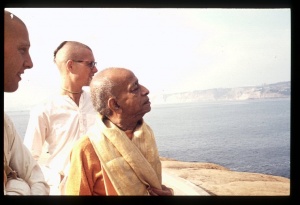CC Antya 4.221: Difference between revisions
m (1 revision(s)) |
No edit summary |
||
| Line 1: | Line 1: | ||
{{ | [[Category:Sri Caitanya-caritamrta - Antya-lila Chapter 04]] | ||
<div style="float:left">'''[[Sri Caitanya-caritamrta|Śrī Caitanya-caritāmṛta]] - [[CC Antya|Antya-līlā]] - [[CC Antya 4|Chapter 4: Sanātana Gosvāmī Visits the Lord at Jagannātha Purī]]'''</div> | |||
<div style="float:right">[[File:Go-previous.png|link=CC Antya 4.220|Antya-līlā 4.220]] '''[[CC Antya 4.220|Antya-līlā 4.220]] - [[CC Antya 4.222|Antya-līlā 4.222]]''' [[File:Go-next.png|link=CC Antya 4.222|Antya-līlā 4.222]]</div> | |||
{{CompareVersions|CC|Antya 4.221|CC 1975|CC 1996}} | |||
{{RandomImage}} | |||
==== TEXT 221 ==== | ==== TEXT 221 ==== | ||
<div | <div class="verse"> | ||
’hari-bhakti-vilāsa’-grantha kailā vaiṣṇava-ācāra | :’hari-bhakti-vilāsa’-grantha kailā vaiṣṇava-ācāra | ||
vaiṣṇavera kartavya yāhāṅ pāiye pāra | :vaiṣṇavera kartavya yāhāṅ pāiye pāra | ||
</div> | </div> | ||
| Line 12: | Line 16: | ||
==== SYNONYMS ==== | ==== SYNONYMS ==== | ||
<div | <div class="synonyms"> | ||
hari-bhakti- | ''hari-bhakti-vilāsa''—of the name ''Hari-bhakti-vilāsa''; ''grantha''—book; ''kailā''—compiled; ''vaiṣṇava-ācāra''—the standard behavior of a Vaiṣṇava; ''vaiṣṇavera''—of a devotee; ''kartavya''—duty; ''yāhāṅ''—in which; ''pāiye pāra''—one can understand up to the extreme limit. | ||
</div> | </div> | ||
| Line 19: | Line 23: | ||
==== TRANSLATION ==== | ==== TRANSLATION ==== | ||
<div | <div class="translation"> | ||
He also compiled the Hari-bhakti-vilāsa, from which we can understand the standard behavior of a devotee and the full extent of a Vaiṣṇava’s duty. | He also compiled the Hari-bhakti-vilāsa, from which we can understand the standard behavior of a devotee and the full extent of a Vaiṣṇava’s duty. | ||
</div> | </div> | ||
| Line 26: | Line 30: | ||
==== PURPORT ==== | ==== PURPORT ==== | ||
<div | <div class="purport"> | ||
Śrīla Bhaktisiddhānta Sarasvatī Ṭhākura writes, “The Hari-bhakti-vilāsa was originally compiled by Śrīla Sanātana Gosvāmī. Later, Gopāla Bhaṭṭa Gosvāmī produced a shortened version of it and added the Dig-darśinī-ṭīkā. In the Hari-bhakti-vilāsa there are so many quotations from the sātvata scriptures that sometimes it is inquired how the atheistic smārtas can refuse to accept them and instead imagine some other opinions. What is recorded in the Hari-bhakti-vilāsa strictly follows the Vedic scriptures and is certainly pure, but the attitude of the karmīs is always one of giving up the conclusion of pure Vaiṣṇava understanding. Because the karmīs are very much attached to the world and material activities, they always try to establish atheistic principles that oppose the understanding of the Vaiṣṇavas.” | Śrīla Bhaktisiddhānta Sarasvatī Ṭhākura writes, “The ''Hari-bhakti-vilāsa'' was originally compiled by Śrīla Sanātana Gosvāmī. Later, Gopāla Bhaṭṭa Gosvāmī produced a shortened version of it and added the ''Dig-darśinī-ṭīkā''. In the ''Hari-bhakti-vilāsa'' there are so many quotations from the ''sātvata'' scriptures that sometimes it is inquired how the atheistic ''smārtas'' can refuse to accept them and instead imagine some other opinions. What is recorded in the ''Hari-bhakti-vilāsa'' strictly follows the Vedic scriptures and is certainly pure, but the attitude of the ''karmīs'' is always one of giving up the conclusion of pure Vaiṣṇava understanding. Because the ''karmīs'' are very much attached to the world and material activities, they always try to establish atheistic principles that oppose the understanding of the Vaiṣṇavas.” | ||
</div> | </div> | ||
__NOTOC__ | |||
<div style="float:right; clear:both;">[[File:Go-previous.png|link=CC Antya 4.220|Antya-līlā 4.220]] '''[[CC Antya 4.220|Antya-līlā 4.220]] - [[CC Antya 4.222|Antya-līlā 4.222]]''' [[File:Go-next.png|link=CC Antya 4.222|Antya-līlā 4.222]]</div> | |||
__NOTOC__ | |||
__NOEDITSECTION__ | |||
Revision as of 18:01, 29 September 2021

A.C. Bhaktivedanta Swami Prabhupada
TEXT 221
- ’hari-bhakti-vilāsa’-grantha kailā vaiṣṇava-ācāra
- vaiṣṇavera kartavya yāhāṅ pāiye pāra
SYNONYMS
hari-bhakti-vilāsa—of the name Hari-bhakti-vilāsa; grantha—book; kailā—compiled; vaiṣṇava-ācāra—the standard behavior of a Vaiṣṇava; vaiṣṇavera—of a devotee; kartavya—duty; yāhāṅ—in which; pāiye pāra—one can understand up to the extreme limit.
TRANSLATION
He also compiled the Hari-bhakti-vilāsa, from which we can understand the standard behavior of a devotee and the full extent of a Vaiṣṇava’s duty.
PURPORT
Śrīla Bhaktisiddhānta Sarasvatī Ṭhākura writes, “The Hari-bhakti-vilāsa was originally compiled by Śrīla Sanātana Gosvāmī. Later, Gopāla Bhaṭṭa Gosvāmī produced a shortened version of it and added the Dig-darśinī-ṭīkā. In the Hari-bhakti-vilāsa there are so many quotations from the sātvata scriptures that sometimes it is inquired how the atheistic smārtas can refuse to accept them and instead imagine some other opinions. What is recorded in the Hari-bhakti-vilāsa strictly follows the Vedic scriptures and is certainly pure, but the attitude of the karmīs is always one of giving up the conclusion of pure Vaiṣṇava understanding. Because the karmīs are very much attached to the world and material activities, they always try to establish atheistic principles that oppose the understanding of the Vaiṣṇavas.”